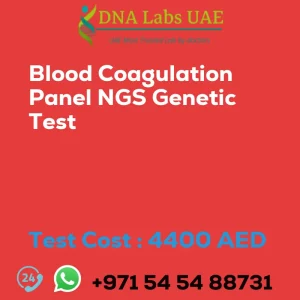RPS26 Gene Diamond-Blackfan Anemia Type 10 Genetic Test
At DNA Labs UAE, we offer the RPS26 Gene Diamond-Blackfan Anemia Type 10 Genetic Test. This test is designed to detect the presence of mutations or variations in the RPS26 gene, which is associated with Diamond-Blackfan anemia type 10. Diamond-Blackfan anemia type 10 is a rare genetic disorder characterized by a failure of the bone marrow to produce enough red blood cells.
Test Components
- Price: 4400.0 AED
- Sample Condition: Blood or Extracted DNA or One drop Blood on FTA Card
- Report Delivery: 3 to 4 Weeks
- Method: NGS Technology
- Test Type: Hematology
- Doctor: Hematologist
- Test Department: Genetics
Pre Test Information
Before undergoing the RPS26 Gene Diamond-Blackfan Anemia Type 10 Genetic Test, it is important to provide the clinical history of the patient. Additionally, a genetic counseling session may be conducted to draw a pedigree chart of family members affected with the RPS26 Gene Diamond-Blackfan Anemia Type 10 NGS Genetic DNA Test gene RPS26.
Test Details
The RPS26 gene is associated with Diamond-Blackfan anemia type 10, a rare genetic disorder. This condition leads to a variety of symptoms, including anemia, low red blood cell count, developmental delays, and physical abnormalities. The NGS genetic test analyzes the DNA sequence of the RPS26 gene to identify any mutations or variations that may be responsible for the disorder.
To perform the test, a DNA sample is obtained from the individual being tested. This can be done through a blood sample or cheek swab. The DNA is then sequenced using NGS technology to identify any variations or mutations in the RPS26 gene. The results of the test can help confirm a diagnosis of Diamond-Blackfan anemia type 10 and provide information about the specific genetic mutation involved.
It is important to note that NGS genetic testing is typically performed by specialized laboratories and requires a healthcare professional’s order. Genetic counseling is also recommended before and after testing to help individuals understand the implications of the results and make informed decisions about their healthcare.
| Test Name | RPS26 Gene Diamond-Blackfan anemia type 10 Genetic Test |
|---|---|
| Components | |
| Price | 4400.0 AED |
| Sample Condition | Blood or Extracted DNA or One drop Blood on FTA Card |
| Report Delivery | 3 to 4 Weeks |
| Method | NGS Technology |
| Test type | Hematology |
| Doctor | Hematologist |
| Test Department: | Genetics |
| Pre Test Information | Clinical History of Patient who is going for RPS26 Gene Diamond-Blackfan anemia type 10 NGS Genetic DNA Test. A Genetic Counselling session to draw a pedigree chart of family members affected with RPS26 Gene Diamond-Blackfan anemia type 10 NGS Genetic DNA Test gene RPS26 |
| Test Details |
The RPS26 gene is associated with Diamond-Blackfan anemia type 10, which is a rare genetic disorder characterized by a failure of the bone marrow to produce enough red blood cells. This condition leads to a variety of symptoms, including anemia, low red blood cell count, developmental delays, and physical abnormalities. NGS (Next-Generation Sequencing) genetic testing is a method used to analyze the DNA sequence of specific genes or the entire genome. In the case of Diamond-Blackfan anemia type 10, NGS can be used to identify mutations or variations in the RPS26 gene that may be responsible for the disorder. The NGS genetic test for Diamond-Blackfan anemia type 10 involves obtaining a DNA sample, usually through a blood sample or cheek swab, from the individual being tested. The DNA is then sequenced using NGS technology to identify any variations or mutations in the RPS26 gene. The results of the NGS genetic test can help confirm a diagnosis of Diamond-Blackfan anemia type 10 and provide information about the specific genetic mutation involved. This information can be important for understanding the prognosis of the condition, determining appropriate treatment options, and providing genetic counseling to affected individuals and their families. It is important to note that NGS genetic testing is typically performed by specialized laboratories and requires a healthcare professional’s order. Genetic counseling is also recommended before and after testing to help individuals understand the implications of the results and make informed decisions about their healthcare. |








